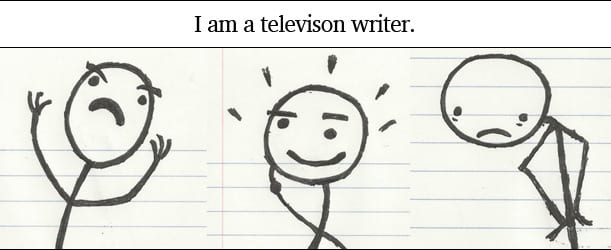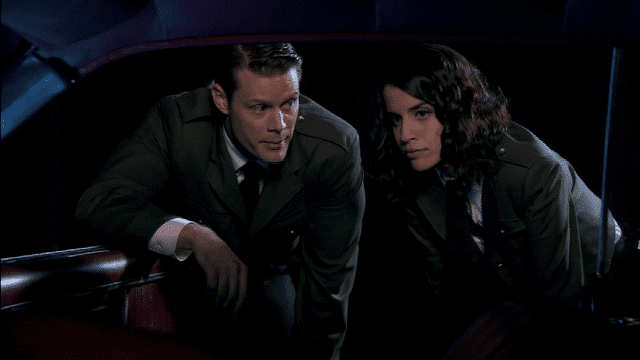Writing Your First Episode of Television
by Sarah Watson on February 22, 2012 in Production
Or: So You Have 70 Pages of Room Notes. Now What?

“After three days he’ll be immortal, and then you’ll need to open a passageway, there’s a sarcophagus, it’s a whole big thing. Just take my word for it, kill it now or it’s a huge pain in the ass.”
It breaks my heart that this little piece of dialogue never made it into my first episode of “The Middleman”. Someone pitched it in the writers’ room and I always thought it was pithy and clever and just sorta cute. I liked it, the room liked it, it was even bolded it in the room notes to signify that the showrunner liked it. So why didn’t I include it in my draft?
To answer that question, let’s take a look at the writers’ room process.
Every show is different, but most rely heavily on the writers’ room to generate stories. On “The Middleman”, the process went a little something like this; we’d gather at ten in the morning, spend half an hour or so arguing about where to order lunch (from what I hear, this process takes longer in comedy rooms), then another half hour to decide on our individual lunch orders (again, add time to this if you’re in a comedy room), then once lunch was settled, we’d dive into breaking the episode. “Breaking” is just a fancy TV way of saying “outlining”. We’d come up with a basic idea that would become more specific as the days wore on. Pitches included everything from story beats, to scene work, and even specific dialogue. Most Middleman episodes took about five to seven days to break. As you can imagine, a lot of material gets pitched out over this time. A LOT. Our intrepid writers’ assistant wrote down every word.
 By the time I was sent off to script for that first episode, I had so many pages of room notes, I had to use a three ring binder to hold them all together. So now what?
By the time I was sent off to script for that first episode, I had so many pages of room notes, I had to use a three ring binder to hold them all together. So now what?
Well, if you’re young, stupid, and eager to please, like I was, you sit your overachieving butt down with a highlighter and go through every page of notes. I highlighted everything that I liked in pink. I highlighted everything the showrunner liked in yellow. My intent was to include every piece of highlighted awesomeness in the script. Sounds brilliant, right?
My first draft was 78 pages. 78 PAGES!
Not only was the draft long, but the scenes were meandering and I didn’t feel like they were landing emotionally. I still had a few days before it was due, so I did what all TV writers would do in that situation. I flung myself facedown onto my bed in a fit of melodramatic self-loathing, cried for a few minutes, then had a glass of wine. When I was done with that, I tossed the highlighter and got out the red pen.
Walking away from good material is hard. But I had to do it. People always ask me the most common mistake I see from rookie writers. Undoubtedly and unequivocally it’s what I did. Trying to include it all.
The room notes can be extraordinarily helpful, but they can also totally screw you. You’ll read over the notes and come across pitches that made the showrunner laugh or cry or say, “yeah, we should do that” and the instinct is to put them all in. He/She loved it in the room, he/she is gonna love it on the page. Uh… not necessarily. They’ll love it if the scene work is solid and the emotional moments land. But it’s really hard to make that happen if you’re shoehorning in every single thing they responded to in the room.
Of course the flip side to this is not including enough of the material from the room. I haven’t seen this mistake with quite the same frequency, but it does happen. Every now and again a script will come in that bears little to no resemblance to what was discussed in the room. All I can say about that is, don’t do it. Unless your script is really, really, really, good. And probably not even then. TV is constantly moving forward and if you go completely off the rails, it’s going to screw over every story coming down the line. Going rogue is for CIA operatives and Sarah Palin. Your showrunner expects you to turn in the story they sent you out to write.
So how much is the right amount to pull from the room? There’s no magic answer. Some stories break clean and every moment magically works from fade in to fade out. Other stories will require a little heavy lifting. Other stories require a lot of heavy lifting. Always go back to the core of the story. Let the dramatic beats and the emotional arc guide the dialogue, not the other way around.
I no longer print the notes out when I get sent off to script. Not only is this kind to the trees — who already take a serious beating from TV production — but it helps me focus on the bigger picture and to not get bogged down in the minutia. And if something isn’t working or I need a refresher, that’s when having 70 pages of notes can be used for good and not evil.
